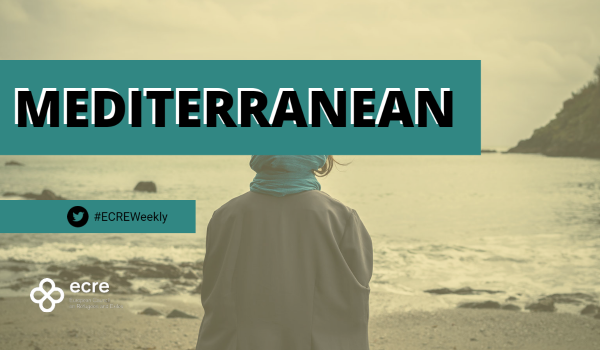- The two Italian migration centres in Albania have finally opened and received their first intake of people seeking asylum.
- A recent ruling by the European Court of Human Rights (ECtHR) may provide encouragement to the people who are stuck in the buffer zone in Cyprus, according to the applicants’ lawyer.
- The ECtHR has ruled that Greece violated the human rights of seven accompanied minors who had been living in a refugee camp on the island of Samos.
The two Italian migration centres in Albania have finally opened and received their first intake of people seeking asylum. The first group of people due to be processed in the centres arrived on 16 October. Italian Prime Minister Giorgia Meloni has described her country’s controversial deal with Albania under which the construction of the two centres has been facilitated as a “new, courageous, unprecedented approach that embodies the European spirit and can be replicated with other non-EU countries”. In a letter to EU leaders dated 14 October, European Commission President Ursula von der Leyen wrote that “with the launch of operations under the Italy-Albania protocol, we will be able to draw practical lessons from this experience”. Contrary to von der Leyen’s apparent enthusiasm for the Italy-Albania Protocol, several human rights organisations have voiced their concerns about the centres. Following the announcement that the centres were finally operational, Amnesty International Italy issued a press release in which it reiterated its “strong concern about possible human rights violations related to the measures provided for in the Protocol”. ECRE member organisation PRO ASYL warned that it was “foreseeable that the Italy-Albania model will also lead to human rights violations such as blanket imprisonment and a lack of legal certainty,” adding: “With the Albania model, the Italian government is deliberately circumventing EU law and undermining the recently adopted CEAS reform”. The International Rescue Committee (IRC) wrote that the first arrivals would represent a “dark day for the EU’s asylum and migration policies”. “The first people to arrive in Italy’s new detention centres deserve better than to be subject to this dangerous political experiment (…) These centres are costly, cruel and counterproductive, and have no place in a humane and sustainable asylum system,” said IRC Italy Country Director Susanna Zanfrini.
A recent ruling by the European Court of Human Rights (ECtHR) may provide encouragement to the people who are stuck in the buffer zone in Cyprus, according to the applicants’ lawyer. In a case relating to two Syrian men who had been pushed back to Lebanon after seeking refuge in Cyprus in 2019, the ECtHR ruled on 8 October that the Cypriot authorities had “essentially returned [the applicants] to Lebanon without processing their asylum claims and without all the steps required under the Refugee Law”. Nicoletta Charalambidou, who represented the two applicants, highlighted the potential importance of the judgment for the growing number of people who are trapped in the buffer zone between the north and south of the country. “At first we saw pushbacks in the sea, now we’re seeing pushbacks in the buffer zone but Cyprus has obligations. It has to provide access to asylum requests wherever they come from and it has to provide dignified reception conditions. It is duty bound to do that under EU and international law,” she said, adding: “This ruling has exposed these illegal practices, and it has set a precedent. It is a perfect win for human rights”.
On 3 October, the ECtHR ruled that Greece had violated the human rights of seven accompanied minors who had been living in a refugee camp on the island of Samos. The cases, which concerned the living conditions in the Samos Reception and Identification Centre, were brought to the ECtHR by two NGOs, Still I Rise and I Have Rights, with support from inter alia ECRE member organisation PRO ASYL. In a press release issued following the two rulings, Giulia Cicoli from Still I Rise, described them as a “historic verdict” because “for the first time the European Court of Human Rights talks about conditions not in line, for any individual, with Article 3 of the Convention”. Cicoli added that the rulings confirmed that “living conditions at the reception and identification centre (RIC) on Samos at the time constituted inhumane and degrading treatment of any individual, regardless of their specific vulnerabilities” and acknowledged the “suffering inflicted by the Greek authorities and supported by the European Union”. She also stated that, unfortunately, conditions on Samos had not improved, despite the closure of the RIC and the opening of the new closed controlled access centre (CCAC) which she described as a “prison where journalists are not allowed” and where minors are “de facto detained around the clock”. Commenting on the ruling, ECRE member organisation Second Tree wrote on Instagram that it constituted a “wake up call for Greece to improve living conditions and ensure that no child is subjected to inhuman or degrading treatment again!”.
Related articles
- MEDITERRANEAN: Disagreement About Funding for New Fence and Concerns About Surveillance on Greece-Türkiye Border ― Investigation into Migrant Death in Greek Police Station ― Italy Considers Further Clampdown on Civilian Search and Rescue Activities; Detains Another Rescue Ship ― Commemorations to Mark 11th Anniversary of Lampedusa Tragedy (October 2024)
- MEDITERRANEAN: Over 1,000 Recorded Deaths in Central Mediterranean Sea in 2024 ― NGOs Mark Ten Years of Civilian Sea Rescue in Central Mediterranean Sea Amid Accusations of ‘Double Standards’ Surrounding Bayesian Yacht Tragedy ― Human Rights NGO Accuses Cyprus of ‘Secondary Refoulement’ of Syrian Refugees ― Greek Coastguard Warns of Dangerous New Tactics Used By People Smugglers; Stands Accused of Causing Death of Migrant By Firing on Boat ― Third Detention Order for Geo Barents Rescue Ship ― Human Rights Award for Maltese NGO (September 2024)

